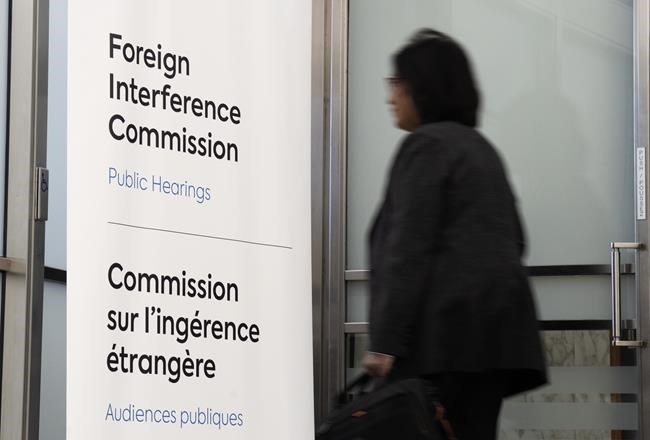OTTAWA — After holding public hearings and gathering evidence in private, inquiry commissioner Marie-Josée Hogue has released an interim report into foreign interference in Canada's last two general elections.
The public inquiry was established after a series of media reports in the Globe and Mail and Global News cited anonymous national security sources who alleged that China meddled in the 2019 and 2021 federal elections.
Some key take-aways from the report:
— Foreign interference in the 2019 and 2021 elections did not change who formed government
Hogue had no difficulty concluding there was foreign interference in the elections, but she said it did not undermine the integrity of the votes.
"The Liberal party would have been in government with or without foreign interference in 2019 and 2021," she wrote.
That conclusion was based on evidence from national security officials and testimony from top Conservative party brass, including former leader Erin O'Toole and his campaign co-chair.
Hogue also said foreign interference has been a known national security threat for decades, and Canada has robust measures to protect voting in elections. However, she also noted that those threats are evolving.
— China is responsible for most of the meddling in Canada's electoral processes
The People's Republic of China is the biggest threat to Canada's elections, according to the Canadian Security Intelligence Service. "The PRC does not support any particular party, but rather supports politics and positions that it views are pro-PRC, regardless of the political affiliation of a particular candidate," Hogue's report said.
Beijing is trying to influence government officials, candidates, political organizations and especially diaspora communities, who are commonly targeted through their extended family members still living in China.
"Governments from people's countries of origin have targeted them on social media and through cyberattacks, surveilled them and threatened them verbally and physically. People spoke about family members in their countries of origin having their passports taken away or denied so they cannot come to Canada to visit," Hogue wrote.
Russia, India, Pakistan and Iran are also possible foreign interference actors, though Hogue said intelligence indicates Russia is not a significant foreign threat.
India may have tried to give financial support to certain candidates in the 2021 election but Hogue said this was done without the candidates knowing, and she hasn't identified shortcomings with the way the government handled those cases.
— Foreign interference is undermining trust in democracy
Hogue found that the main impact of foreign interference in the last two elections is that it's made some people lose trust in the democratic process, "rightly or wrongly."
"While awareness and foreign interference may at one time have been largely within the domain of security and intelligence agencies and hidden from public view, the cat is now out of the proverbial bag," the report said.
Hogue said undermining faith in democracy is one of the main goals for states that are meddling in foreign elections, and it's important for the government to work hard to rebuild that trust.
She also noted that the commission must take care that its work doesn't unnecessarily erode public confidence in a system "that remains fundamentally sound."
Hogue said this paradox is something the government is also grappling with as it oversees the integrity of elections. The report said it appears that government required a very high degree of certainty that foreign states were responsible for online activity — something the commission found to be difficult to determine — before it alerted Canadians.
— The commission is not sharing all the information it has seen and heard
From the outset, there have been concerns about secrecy and national security in this inquiry.
The Liberal government initially opposed calls for a public inquiry on the basis that a lot of the information would have to be kept secret.
Instead, it appointed former governor general David Johnston as a "special rapporteur" responsible for investigating foreign interference and making recommendations to government. Johnston filed an initial report last May that concluded foreign state actors, especially from China, did try to interfere in the 2021 and 2019 votes but did not change the results.
He also concluded that holding a public inquiry would not be useful because so much information would have to be protected.
After that report was released, opposition parties questioned Johnston's ties to the prime minister's family and called for him to step down. Johnston resigned in June, saying the partisan atmosphere made it impossible for him to continue.
Hogue has said her team is working to strike a difficult balance between shedding light on what happened and protecting Canada's national security interests.
The inquiry has access to unredacted documents and has heard from government officials behind closed doors. Hogue said she required the government to justify any redactions and the commission's lawyers have made challenges in some cases.
"As certain facts cannot be disclosed publicly for reasons of national security, the report includes a classified supplement that may only be consulted by those with the requisite security clearance and a 'need to know,'" Hogue wrote in her report.
She added that the contents of that top-secret supplement support her conclusions in the report.
— There are elements left to study
The interim report lays out some of the questions Hogue wants to explore further in the commission's next phase, with hearings likely in the fall.
That includes "the question of how intelligence and information about foreign interference should be communicated within government, and how that information should be communicated to the public, and to those likely to be vulnerable to foreign interference," Hogue wrote.
She also wants to further explore whether Canada has the tools to effectively respond to online misinformation or disinformation.
Party nomination contests will also come under the microscope. The commission has found nominations are particularly vulnerable to foreign meddling and plans to take a look at the rules governing them.
This report by The Canadian Press was first published May 3, 2024.
Sarah Ritchie, The Canadian Press




